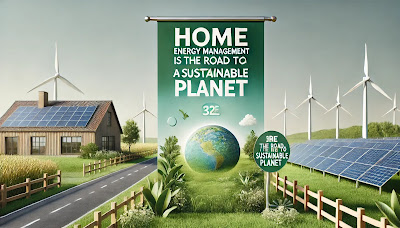
With rising energy costs and increasing environmental concerns, homeowners are constantly seeking new ways to reduce their electricity bills. Efficient Home Energy Management (HEM) is not just about cutting costs; it’s also about optimizing energy use, minimizing waste, and making your home more sustainable. This guide provides practical strategies, incorporating the latest expert recommendations, to help you manage your home’s energy consumption effectively and lower your monthly expenses.
What is Home Energy Management?
Home Energy Management refers to the process of monitoring, controlling, and optimizing energy usage within your household. This can range from simple practices like turning off unused appliances to using advanced technologies such as smart thermostats and energy monitoring systems. By adopting effective HEM strategies, you can ensure that energy is used efficiently, saving both money and resources.
Benefits of Efficient Home Energy Management
Lower Energy Bills: Identifying and reducing energy waste leads to significant cost savings.
Environmental Impact: Efficient energy use reduces your carbon footprint and contributes to environmental sustainability.
Increased Property Value: Energy-efficient homes are attractive to buyers, potentially increasing your home’s market value.
Sources of Information in the Chart:
- Programmable Thermostat Savings: Energy Star
- Energy-Efficient Windows Savings: Energy Star
- Insulation Savings: The Scottish Sun
- ENERGY STAR Appliances Savings: New York Post
- Unplugging Idle Electronics Savings: New York Post
Practical Steps to Reduce Your Electricity Bill
1. Conduct a Comprehensive Energy Audit
An energy audit helps identify areas where your home is losing energy and offers solutions for improvement.
Professional Energy Audits: Hiring a certified energy auditor provides an in-depth analysis of your home's energy efficiency, pinpointing specific areas where energy is wasted. (Source: energy.gov)
DIY Energy Assessments: Utilize online tools and resources to perform a basic energy audit yourself. The U.S. Department of Energy offers guidelines on conducting DIY home energy assessments.
2. Upgrade to Energy-Efficient Appliances
Investing in energy-efficient appliances can lead to substantial long-term savings.
Energy Star Certified Appliances: These appliances meet strict energy efficiency guidelines set by the U.S. Environmental Protection Agency, consuming less energy without compromising performance. Replacing old appliances with Energy Star models can save you about $450 annually on energy bills. (Source: nypost.com)
Smart Power Strips: Many electronics consume energy in standby mode, known as "phantom loads." Using smart power strips can prevent this unnecessary consumption by completely cutting off power when devices are not in use. (Source: satellitebeach.gov)
3. Implement Smart Home Technologies
Smart home devices can optimize energy usage by adapting to your lifestyle.
Smart Thermostats: Devices like Nest or Ecobee learn your schedule and adjust heating and cooling settings accordingly, leading to significant energy savings. Proper use of programmable thermostats can save about $180 annually. (Source: energystar.gov)
Smart Lighting Systems: LED bulbs integrated with smart controls allow you to schedule lighting, adjust brightness, and even change colors remotely, reducing energy consumption.
4. Enhance Home Insulation and Seal Air Leaks
Proper insulation and sealing can prevent heat loss, reducing the need for excessive heating or cooling.
Attic and Wall Insulation: Upgrading insulation in these areas can lead to significant energy savings. For instance, installing loft insulation can save approximately £230 annually. (Source: thescottishsun.co.uk)
Weatherstripping and Caulking: Sealing gaps around windows and doors prevents drafts, maintaining indoor temperatures and reducing energy costs.
5. Optimize Heating, Ventilation, and Air Conditioning (HVAC) Systems
Efficient HVAC systems are crucial for maintaining comfort without excessive energy use.
Regular Maintenance: Schedule annual inspections and replace filters regularly to ensure optimal performance.
Use of Ceiling Fans: Ceiling fans can help distribute air evenly, allowing you to set your thermostat higher in the summer and lower in the winter, thereby saving on heating and cooling costs.
6. Leverage Renewable Energy Sources
Incorporating renewable energy can significantly reduce reliance on grid electricity.
Solar Panels: Installing solar panels can reduce or even eliminate your electric bill. As more homes add electric vehicles, heat pumps, and other all-electric equipment, going solar becomes an increasingly valuable investment. (Source: nyserda.ny.gov)
Community Solar Programs: If installing personal solar panels isn't feasible, consider subscribing to community solar programs, which can reduce electricity bills by 5 to 15 percent annually. (Source: bhg.com)
7. Adopt Energy-Saving Habits
Simple behavioral changes can lead to noticeable energy savings.
Unplug Idle Electronics: Many devices consume energy in standby mode. Unplugging chargers and electronics when not in use can prevent this "vampire" energy loss. (Source: nypost.com)
Efficient Use of Appliances: Only run dishwashers and washing machines with full loads, and consider air-drying clothes to save energy.
Efficient Home Energy Management is an ongoing process that involves regular monitoring, smart investments, and behavioral adjustments. By implementing these expert-backed strategies, you can significantly reduce your electricity bills, enhance your home’s comfort, and contribute to a more sustainable future. Start with small changes today and gradually build towards a fully optimized, energy-efficient home.

